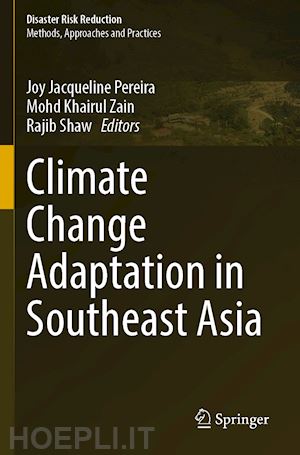
Questo prodotto usufruisce delle SPEDIZIONI GRATIS
selezionando l'opzione Corriere Veloce in fase di ordine.
Pagabile anche con Carta della cultura giovani e del merito, 18App Bonus Cultura e Carta del Docente
This book highlights the current issues, challenges, and priorities for climate change adaptation in the ten member states of the Association of Southeast Asian Nations (ASEAN). The status of each country was prepared by a consortium of researchers in consultation with National Focal Points of the ASEAN Working Group on Climate Change (AWGCC). National documents on adaptation actions, including local scenario and priorities, were reviewed where available and supplemented with an assessment of scientific publications to identify vulnerable ecosystems and regions. Adaptation needs and priorities were determined through stakeholder consultation in the respective countries. This allows for local-level perspectives to be captured and brought to the attention of policy and decision-makers at the national and regional levels. An important lesson from this exercise is that universities and research institutions at the national level have a critical role to play in bridging the gap between science and policy in climate change adaptation. These institutions also have the capacity to continuously facilitate transfer of the best available science for advancing climate change adaptation at the local level.
Dr. Joy Jacqueline Pereira is a professor and principal research fellow at Universiti Kebangsaan Malaysia’s Southeast Asia Disaster Prevention Research Initiative (SEADPRI-UKM) and fellow of the Academy of Sciences Malaysia. She is vice chair of the Intergovernmental Panel on Climate Change (IPCC) Working Group 2 on Impacts, Adaptation and Vulnerability and a member of the UNISDR Asia Science, Technology and Academia Advisory Group (ASTAAG). Previously, Prof. Pereira served as coordinating lead author for the Asia Chapter of the IPCC Fifth Assessment Report (2014), lead author for the IPCC-AR5 Synthesis Report (2014), and review editor for the IPCC Special Report on Managing the Risks of Extreme Events and Disasters to Advance Climate Change Adaptation (2012). In 2009, Prof. Pereira led the team that developed the National Policy on Climate Change for the Government of Malaysia.
Mr. Mohd Khairul Zain is a senior science officer at Universiti Kebangsaan Malaysia’sSoutheast Asia Disaster Prevention Research Initiative (SEADPRI-UKM). He is currently involved in research projects related to disaster risk reduction. He also actively provides input, technical advice, and support in the formulation of various government actions and negotiations on national, regional, and international platforms. In 2013, Mr. Zain was involved in the formulation of the country’s National Platform and Action Plan for Disaster Risk Reduction (MyDRR), which serves to integrate disaster risk reduction and climate change adaptation, engage communities, and build resilience at the local level. Mr. Zain managed the successfully completed ASEAN Project on Enhancing Climate Change Adaptation in Southeast Asia funded by the ASEAN India Green Fund.
Dr. Rajib Shaw is a professor in the Graduate School of Media and Governance in Keio University’s Shonan Fujisawa Campus (SFC). Prof. Shaw was the chair of the UNDRR’s Global Science Technology Advisory Group (Global STAG) and a co-chair of the UNDRR’s Asia Pacific Science Technology Advisory Group (AP-STAG). He is also coordinating lead author for the Asia Chapter of the IPCC Sixth Assessment Report. He is, in addition, the co-founder of a Delhi based start-up called RIKA (Resilience Innovation Knowledge Academy). Previously, he was the executive director of the Integrated Research on Disaster Risk (IRDR) and prior to that a professor in the Graduate School of Global Environmental Studies of Kyoto University. Prof. Shaw has published more than 50 books and over 400 research papers.











Il sito utilizza cookie ed altri strumenti di tracciamento che raccolgono informazioni dal dispositivo dell’utente. Oltre ai cookie tecnici ed analitici aggregati, strettamente necessari per il funzionamento di questo sito web, previo consenso dell’utente possono essere installati cookie di profilazione e marketing e cookie dei social media. Cliccando su “Accetto tutti i cookie” saranno attivate tutte le categorie di cookie. Per accettare solo deterninate categorie di cookie, cliccare invece su “Impostazioni cookie”. Chiudendo il banner o continuando a navigare saranno installati solo cookie tecnici. Per maggiori dettagli, consultare la Cookie Policy.